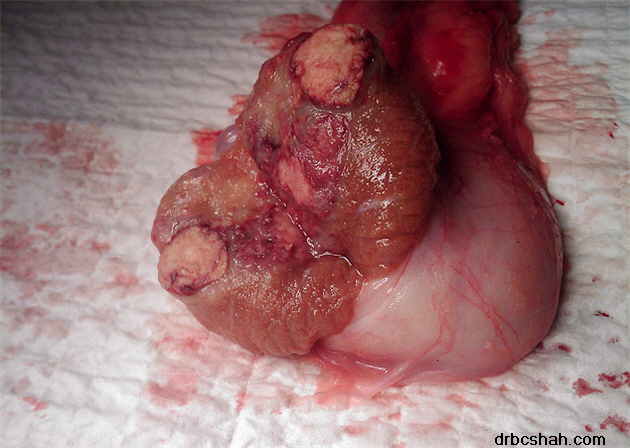Testicle Removal (Orchiectomy)
Orchiectomy is the removal of the testicles. The penis and the scrotum, the pouch of skin that holds the testicles, are left intact. An orchiectomy is done to stop most of the body’s production of testosterone, which prostate cancer usually needs in order to continue growing.
What To Expect After Surgery
Orchiectomy can be done as an outpatient procedure or with a short hospital stay. Regular activities are usually resumed within 1 to 2 weeks, and a full recovery can be expected within 2 to 4 weeks.
Why It Is Done
Orchiectomy may help relieve symptoms, prevent complications, and prolong survival for advanced prostate cancer. Radiation treatment is sometimes needed also.
How Well It Works
Orchiectomy often causes the tumor to shrink and relieves bone pain.
This surgery does not cure prostate cancer, although it may prolong survival.
Risks
Orchiectomy causes sudden hormone changes in the body. Side effects from hormone changes include:
- Sterility.
- Loss of sexual interest.
- Erection problems.
- Hot flashes.
- Larger breasts (gynecomastia).
- Weight gain.
- Loss of muscle mass.
- Thin or brittle bones (osteoporosis).
What To Think About
Removing the testicles is one way to cut down on testosterone and other male hormones, or androgens. Taking medicine is another way to reduce androgen levels in your body. Some men may prefer surgery over taking pills or having injections. But if you choose to take medicine, you can stop taking the hormone drugs. And the side effects from taking medicine may go away. An orchiectomy is permanent.
Some men choose to have reconstructive surgery after an orchiectomy, in which Dr. B C Shah replaces the testicles with artificial testicles.


 Dr. Bimal Shah is the senior most General & Laparoscopic surgeon in Mira – Bhayandar with largest series of operations. He also consults at Borivali – Dahisar. He believes in ethical practice & is available at only trust hospitals. He passed out from KEM hospital, Mumbai in 1993 and was a lecturer training newer surgeons & medical students till 1998.
Dr. Bimal Shah is the senior most General & Laparoscopic surgeon in Mira – Bhayandar with largest series of operations. He also consults at Borivali – Dahisar. He believes in ethical practice & is available at only trust hospitals. He passed out from KEM hospital, Mumbai in 1993 and was a lecturer training newer surgeons & medical students till 1998. 








